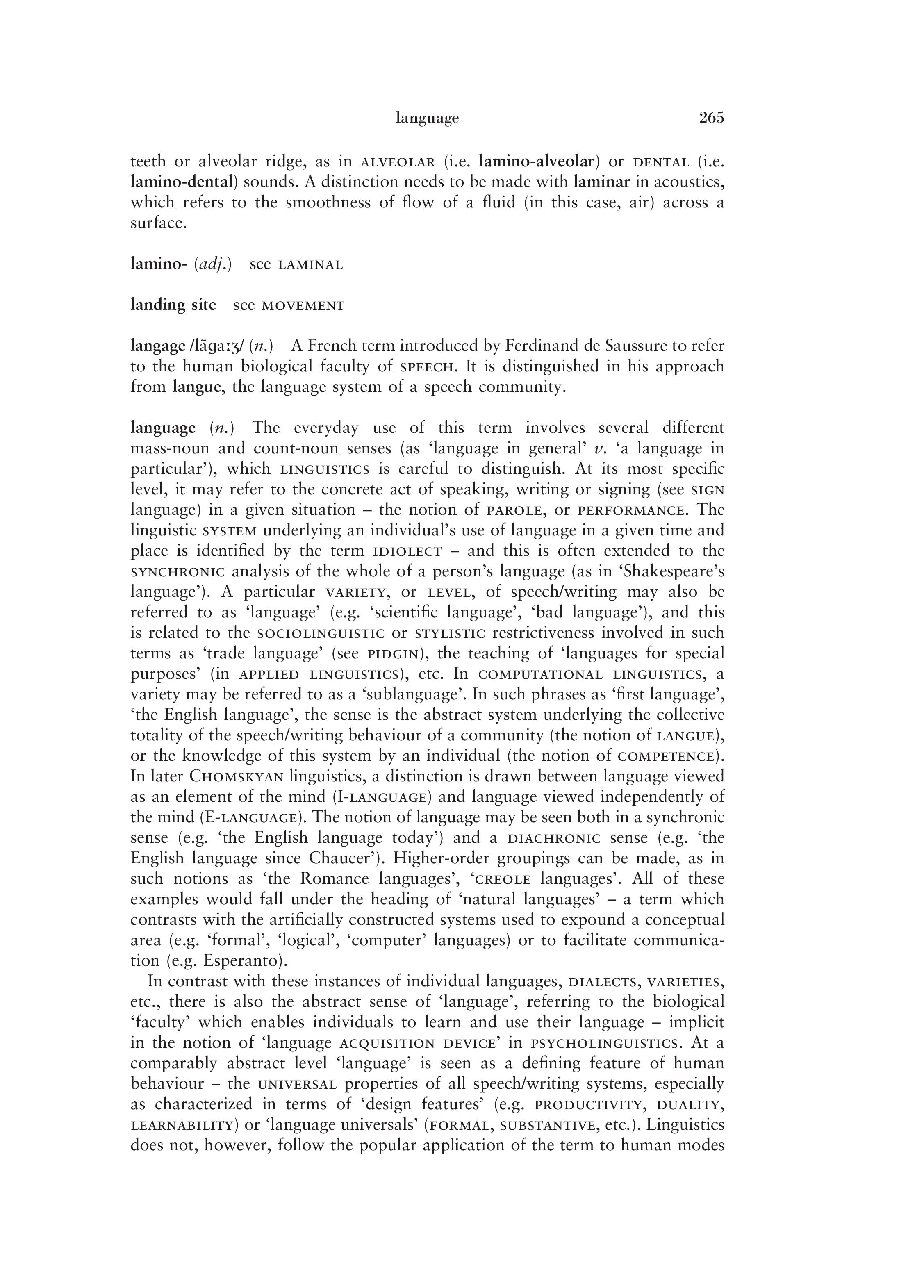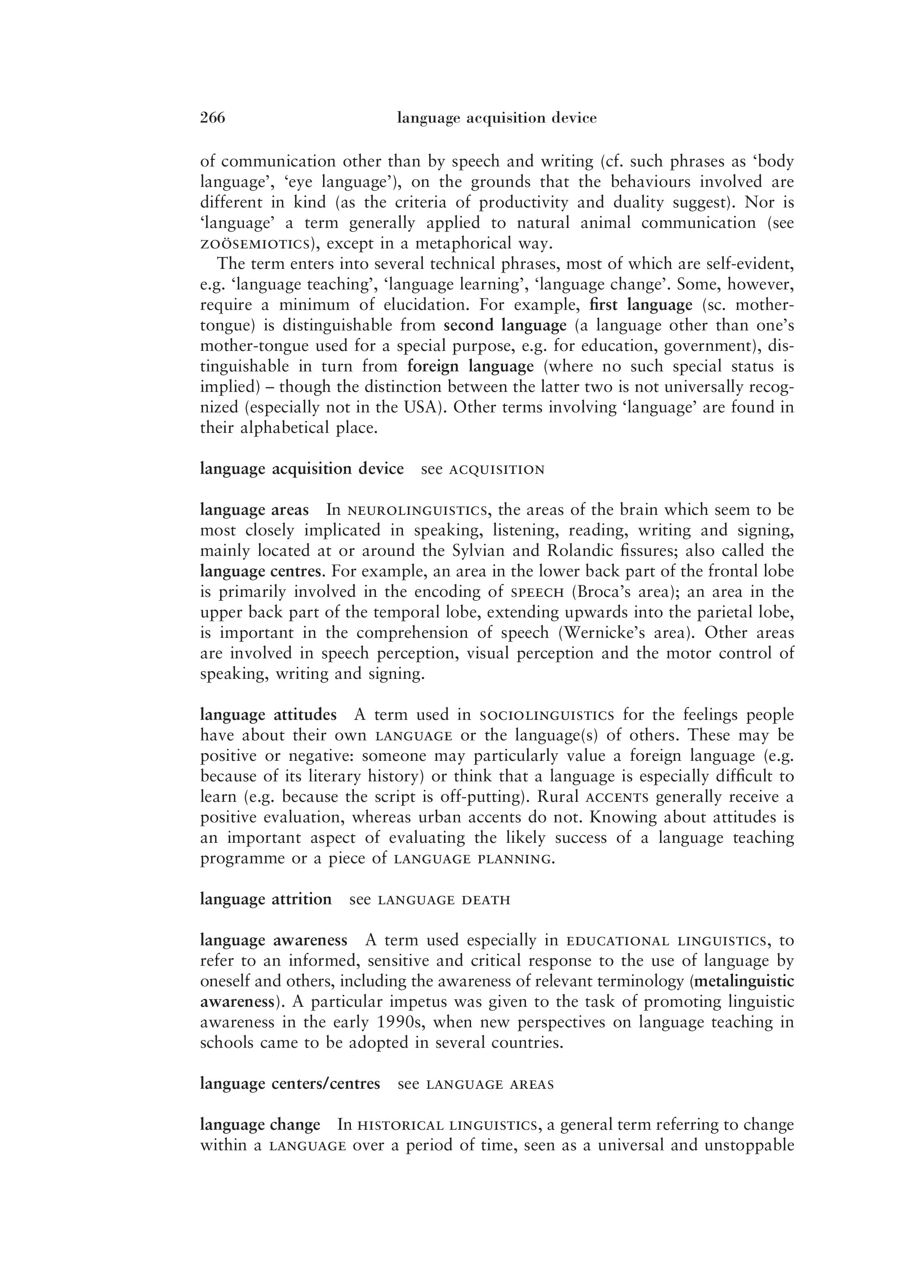Definition of Language
Source: A Dictionary of Linguistics and Phonetics
"language" n.
The everyday use of this term involves several different mass-noun and count-noun senses (as ‘language in general’ v. ‘a language in particular’), which linguistics is careful to distinguish. At its most specific level, it may refer to the concrete act of speaking, writing or signing (see sign language) in a given situation – the notion of parole, or performance. The linguistic system underlying an individual’s use of language in a given time and place is identified by the term idiolect – and this is often extended to the synchronic analysis of the whole of a person’s language (as in ‘Shakespeare’s language’). A particular variety, or level, of speech/writing may also be referred to as ‘language’ (e.g. ‘scientific language’, ‘bad language’), and this is related to the sociolinguistic or stylistic restrictiveness involved in such terms as ‘trade language’ (see pidgin), the teaching of ‘languages for special purposes’ (in applied linguistics), etc. In computational linguistics, a variety may be referred to as a ‘sublanguage’. In such phrases as ‘first language’, ‘the English language’, the sense is the abstract system underlying the collective totality of the speech/writing behaviour of a community (the notion of langue), or the knowledge of this system by an individual (the notion of competence). In later Chomskyan linguistics, a distinction is drawn between language viewed as an element of the mind (I-language) and language viewed independently of the mind (E-language). The notion of language may be seen both in a synchronic sense (e.g. ‘the English language today’) and a diachronic sense (e.g. ‘the English language since Chaucer’). Higher-order groupings can be made, as in such notions as ‘the Romance languages’, ‘creole languages’. All of these examples would fall under the heading of ‘natural languages’ – a term which contrasts with the artificially constructed systems used to expound a conceptual area (e.g. ‘formal’, ‘logical’, ‘computer’ languages) or to facilitate communication (e.g. Esperanto).
In contrast with these instances of individual languages, dialects, varieties, etc., there is also the abstract sense of ‘language’, referring to the biological ‘faculty’ which enables individuals to learn and use their language – implicit in the notion of ‘language acquisition device’ in psycholinguistics. At a comparably abstract level ‘language’ is seen as a defining feature of human behaviour – the universal properties of all speech/writing systems, especially as characterized in terms of ‘design features’ (e.g. productivity, duality, learnability) or ‘language universals’ (formal, substantive, etc.). Linguistics does not, however, follow the popular application of the term to human modes of communication other than by speech and writing (cf. such phrases as ‘body language’, ‘eye language’), on the grounds that the behaviours involved are different in kind (as the criteria of productivity and duality suggest). Nor is ‘language’ a term generally applied to natural animal communication (see zoösemiotics), except in a metaphorical way. The term enters into several technical phrases, most of which are self-evident, e.g. ‘language teaching’, ‘language learning’, ‘language change’. Some, however, require a minimum of elucidation. For example, first language (sc. mothertongue) is distinguishable from second language (a language other than one’s mother-tongue used for a special purpose, e.g. for education, government), distinguishable in turn from foreign language (where no such special status is implied) – though the distinction between the latter two is not universally recognized (especially not in the USA). Other terms involving ‘language’ are found in their alphabetical place.
Crystal, DLP, 265–266. [View as image] [Read on OMNIKA]
Page Image(s)


Citation
PsychLing Contributors. "Language." PsychLing, OMNIKA Foundation, 4 Aug. 2023, psylng.org/glossary/term/language. Accessed 16 Feb. 2026.
PsychLing (2023, August 4). Language. Retrieved from https://psylng.org/glossary/term/language
Bibliography
APA Contributors. "APA Dictionary of Psychology." Washington, DC: American Psychological Association. Accessed September 14, 2023. https://dictionary.apa.org. [Visit]
Crystal, David, ed. A Dictionary of Linguistics and Phonetics. 6ed. Malden, MA: Blackwell Publishing, 2011.
Hammarström, Harald, Robert Forkel, Martin Haspelmath, and Sebastian Bank. "Glottolog: A Database of Languages." Leipzig, Germany: Max Planck Institute for Evolutionary Anthropology. Created 2011. Accessed July 28, 2023. https://glottolog.org. [Visit]
Internet Archive Contributors. "Wayback Machine." San Francisco, CA: Internet Archive. Created October 24, 2001. Accessed July 21, 2023. https://web.archive.org. [Visit]
